|
 
IN
THE NEWS | GARDEN | PUBLISHER | ART BEAT | GOOD NEWS | CALENDAR
![Yes or no and who? California's recall frenzy [photos of Gray Davis, and governor candidates]](cover1002-photohed.jpg)
Top: Gov. Gray Davis.
Middle: Peter Camejo, Arianna Huffington, Arnold Schwarzenegger.
Bottom: Tom McClintock, Cruz Bustamante.
IN
THEIR WORDS | HUMBOLDT RESIDENTS VOTE
PROPOSITIONS | ANALYSIS: RECALL | PETER CAMEJO
A sampling of the candidates...
IT STARTED ONE MORNING IN
EARLY FEBRUARY, WHEN ANTI-TAX ADVOCATE TED COSTA -- a right-winger
even by Republican standards -- announced on a Sacramento area
radio station that he was collecting signatures to recall Gov.
Gray Davis. The effort languished, until a conservative state
legislator, Darrel Issa, chipped in $2 million of his car-alarm
fortune. Within days, a professional signature-gathering drive
was underway. In the end, 1.3 million voters signed petitions
calling for the ouster of the man who was elected to a second
term only last November.
Now, Davis is within days
of suffering what would be an unprecedented humiliation. No governor
of California has ever been recalled and if he were unseated,
Davis's political career would almost certainly be over. Yet
it would be surprising if many tears were shed, as Davis is a
politician notably lacking in warmth. Some say that, ultimately,
he's facing such an ignominious fate because of the emotional
gulf that separates him from the electorate. Others -- notably
Bill Clinton and Dianne Feinstein -- say Davis is the victim
of an unjust hijacking of the governor's office led by his political
enemies. Republicans, for their part, say Davis is being recalled
because he brought on and then tried to conceal the state's budget
crisis.
If Davis sinks -- which appears
likely -- and Arnold Schwarzenegger replaces him -- also probable
-- then Californians will have crossed a Rubicon, of sorts. The
successful use of the recall power written into the State Constitution
could very well open the door to further political turmoil --
both in the near term, if Democrats wait the required six months
and counterattack with a recall bid of their own; and over the
long haul, if future governors shy away from taking unpopular
stands for fear of going the way of Davis. Meantime, the $30
billion deficit isn't going to disappear. If the political will
is not mustered to do what everyone knows needs to be done --
cut spending and raise taxes -- the state could end up facing
financial ruin.
Against that cheery backdrop
we offer in this issue a hodge-podge of recall-related stories:
A look at the Davis replacement candidates you haven't heard
about; a Q-and-A with the Green Party's best hope, Peter Camejo;
an examination of whether those leading the recall really are
guilty of abusing what is their constitutionally granted right;
and the skinny on what two dozen or so Humboldt voters plan to
do when the voting booth curtain closes behind them on election
day.
IN
THEIR WORDS
WE ALL KNOW ARNOLD.
And most of us are aware of
Cruz, Arianna, McClintock and Camejo. And, of course, Gary Coleman
(not to mention Larry Flynt). But Logan Darrow Clements? Reva
Renee Renz? Ned Roscoe?
While there's much to disagree
on about the upcoming gubernatorial recall election, one thing
is beyond dispute: The vast majority of the 133 candidates running
to replace Gov. Gray Davis are alike in their obscurity. Since
poor name recognition typically dooms a campaign, it raises the
question of why these folks -- who paid as much as $3,500 to
qualify for the ballot --running. We decided to e-mail them and
ask.
The answers were as varied as
the candidates. One said the recall is wrong and that if he wins
he'll name Davis as his chief of staff. Another, a photojournalist,
is running simply in order to visually chronicle the experience.
A third intends to legalize prostitution. Humboldt's only candidate,
HSU chemistry teacher Darin Price, wants more attention paid
to North Coast issues.
Not everyone responded to our
e-mail query, and we weren't able to reach all the candidates,
as some appear to not have e-mail addresses. But we did contact
more than 100. Here, only slightly edited, are the replies of
27 of them.
Brooke Adams, Dana Point. Business executive.
The state is a mess. The old
generation has provided no leadership. They've had a $38 billion
party and now they are sticking my generation with the bill.
Our state needs change and action. Our leaders aren't representing
the majority of Californians. They aren't even being honest.
They are selling off our state and selling off their souls for
votes.
Doug Anderson, Moorpark. Mortgage broker.
I have seen California go from
one of the most progressive states in the nation to one of the
least desirable business environments. As governor I will focus
on eliminating the budget deficit [through] restraints on spending,
reducing benefits to illegal immigrants and controlling the increasing
cost of workers' compensation due to administrative waste and
fraud. My goal is to reinstate California as a national leader
in business, education and to restore personal freedoms.
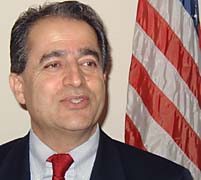 Badi
Badiozamani, San Diego. Entrepreneur,
author, executive. [photo
at left] Badi
Badiozamani, San Diego. Entrepreneur,
author, executive. [photo
at left]
I am a candidate from the people
for the people. My aim is to create an environment where we can
thrive again by eliminating the barriers to our productivity.
I will rescind Gov. Davis' harmful policies, such as the 300
percent car tax, and I will streamline taxes, place priority
on education, stop university tuition increases and tackle the
traffic that is choking our cities. I will give a voice to those
living without health care and protect citizens against crime.
I will revitalize government with a thoughtful, rational approach
to planning and decision-making that will allow this state to
rise and shine strong as a truly golden state.
Vik Bajwa, Santa Rosa. Businessman, father, entrepreneur.
[I am running] to get a savings
plan in action for California. [There is] too much spending on
everything. [I support a] homeland security act for California
and good schools for children.
John Beard, North Hollywood. Businessman.
Davis is a bad man. He has sold
our state out. I could not run [my] business this way. I would
love to give my employees a 37 percent pay raise like the prison
guards or other unions. Instead, I will [have to] pay my 300
percent increase in workers' compensation and let my employees
pay increased taxes to pay state workers. I have no special interest
group. Californians will be my only special interest group.
John Christopher Burton, Pasadena. Civil rights lawyer.
I am running to present California
voters with a socialist alternative to the major candidates.
California's economic slump and the resulting budget crisis cannot
be attributed simply to mismanagement by Gov. Davis. California
is a concentrated expression of a world economic slump and the
international crisis of the capitalist system. The Bush administration's
response to the crisis is the sucking of hundreds of billions
away from the states to fund imperialist wars of aggression overseas.
The Democrats, as big business politicians, in the long run support
these same policies and do not present any meaningful opposition.
The working families of the state need to build the Socialist
Equality Party as a working class party independent of big business.
Logan Darrow Clements, Pacific Palisades. Businessman.
I want to maximize the economy
by minimizing the government. I'm an objectivist, fan of philosopher
Ayn Rand and favor minimum government so we can have laissez-faire
capitalism.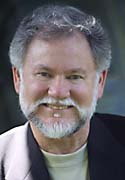
Warren Farrell, Carlsbad. Fathers' issues author. [photo at right]
[I am running for governor]
to make sure no court ever allows a divorced mom or dad to take
a child away from the other parent, assuming that parent is responsible.
Children need both parents, because half the child is the mom
and half the child is the dad, and when deprived of either, a
child suffers. Second, I have created a new concept in social
programs. There are some programs that the state can sponsor
that would, ironically, both reduce the involvement of the state
and, instead of costing the state money, save the state billions
of dollars.
 Lorraine
(Abner Zurd) Fontanes, Los Angeles.
Filmmaker. [photo at left] Lorraine
(Abner Zurd) Fontanes, Los Angeles.
Filmmaker. [photo at left]
I began by making an autobiographical
film of the process of collecting signatures and qualifying for
the ballot, which I thought would be useful and informational
for many citizens. By the end of the process I had spoken to
so many people and been touched by so many lives that I felt
I had a responsibility to do everything in my power to help California
regain her sanity and save her future.
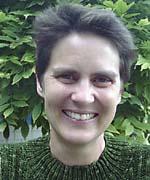 Diana
Foss, San Jose. Mother. [photo at right] Diana
Foss, San Jose. Mother. [photo at right]
Although I have no political
experience, I've always been interested and aware of what's going
on in politics. And the prospect of Darrell Issa's spending almost
$2 million to buy himself an election got me so angry that I
decided I had to do something about it.
I am running only to oppose
the recall. Gov. Davis was legitimately reelected less than a
year ago, and he has committed no malfeasance that would justify
recalling him. The recall should be the "nuclear option"
of politics, reserved only for the worst cases of misconduct
in office. But this recall is being used as a tool of day-to-day
partisan politics, opening the door to more frivolous recalls
in the future. I don't want anyone to vote for me, but I do want
you to vote no on Oct. 7.
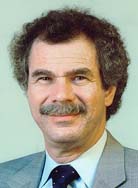 Rich
Gosse, San Rafael. Educator.
[photo at left] Rich
Gosse, San Rafael. Educator.
[photo at left]
I am running for governor because
I have the solution to our budget crisis and also our high crime
rate: decriminalize victimless crimes (drugs, gambling, prostitution).
This would cut serious crime in half in California, because drug
addicts would no longer have to burglarize our homes and mug
us on the street in order to pay for their exorbitant habits.
It would also save billions of dollars that are currently being
wasted arresting, prosecuting and incarcerating victimless criminals.
Once we decriminalize these vices, we can tax them and raise
the $38 billion we need to solve our financial woes.
Ivan Hall, Redding. Custom denture manufacturer.
I am running because it's a
historic opportunity for a common individual to be on the ballot
for governor of California. This is my opportunity to say what
I think California should do. California should massively invest
in photovoltaics and place them on all appropriate government
buildings -- thus reducing dependence on fossil fuels and the
need to build more centralized power plants and transmission
lines.
Jim Hoffmann, Manteca. Teacher.
The problem with California
is that the politicians forget who they work for -- the voters.
Sacramento has too many egos, not enough brains. I am a working,
middle-class candidate who represents the average person who
pays the bills for everyone else. If elected, I will make Sacramento
bow to the needs of the people, and not the whims of the elected
politicians.
Kelly Kimball and Scott Mednick, Calabasas. Business
executives.
[We are] running for governor
to draw attention to the fact that any system that allows two
people to be on the ballot to run the 5th largest economy in
the world while promoting their beer is a system that must be
fixed!
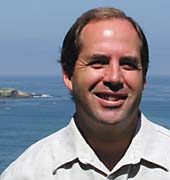 Eric
Korevaar, La Jolla. Scientist/businessman.
[photo at right] Eric
Korevaar, La Jolla. Scientist/businessman.
[photo at right]
I am running for governor to
oppose the recall, which got on the ballot in a manner I object
to involving paid signature-gathering sponsored by a single individual
for political purposes.
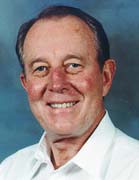 Dick
Lane, Sunnyvale. Educator. [photo at left] Dick
Lane, Sunnyvale. Educator. [photo at left]
Six of my seven children were
born in California, so I have a very personal stake in the future
of our state. I am a lifelong Democrat who can work across party
lines in the Assembly and Senate.
I am running to restore the
$443 million cuts to the California State University system in
the current budget, establish a basic level of health care for
all, similar to Oregon and Hawaii, and provide the alternative
of public financing for all state elections.
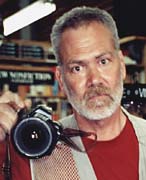 Gary
Leonard, Los Angeles. Photojournalist/author.
[photo at right] Gary
Leonard, Los Angeles. Photojournalist/author.
[photo at right]
As a photojournalist, this was
a fantastic opportunity to cover a story from the inside out,
and the outside in. I am opposed to the recall, but since it
was going to happen with or without me, I jumped in. It's been
an incredible story.
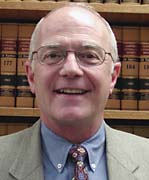 Paul
Mariano, Martinez. Attorney. Paul
Mariano, Martinez. Attorney.
I am running for governor because
I am opposed to the recall. I am running for Gray Davis because
he can't run on the second half of the ballot. My first act as
governor will be to name Gray Davis as my chief of staff in charge
of the day-to-day governance of the state.
Gray Davis may be unpopular,
but he is the duly elected governor of California.
He won that post in a fair and
democratic election held just last year. My candidacy is the
only way to ensure that the legitimately elected governor remains
in office.
People are now trying to remove
him from the governor's office. It's unfair and undemocratic
that a small percentage of last year's electorate can get this
costly recall measure on the ballot, and then prevent Gov. Davis
from running on the second half of the ballot. All of the people
who vote no on the first part of the ballot are disenfranchised
on the second part where they are not allowed to vote for Gray
Davis. That's not democracy.
There is much more at stake
here than the governorship, or the popularity of a person. Our
democratic freedoms and principles are at risk. I am running
for governor to protect the integrity and finality of our electoral
process, to protect democracy itself.
John "Jack" Mortensen, Folsom. Contractor/businessman.
Who will effect a difference
in this structure of government to assure that the "common
good" will be fairly included? Who will stand, party aside,
special interest aside, and reform and refine this government?
At this point I feel Gray Davis has the most to lose and the
most to gain. Vote no on the recall and yes for Jack Mortensen.
The people have been allowed to speak and be heard. If Davis
wants to save his career, he needs these three remaining years
to redeem himself. Any other top end candidate would be stalemated
by the Legislature much like they did to Clinton in his first
presidential term.
Heather Peters, Santa Monica. Mediator.
I am running for governor to
bring accountability, responsibility and accessibility back to
Sacramento and to use my skills as a professional mediator to
break the deadlock in the Legislature.
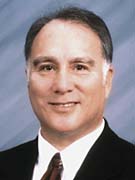 Charles
"Chuck" Pineda, Jr.,
Sacramento. State hearing officer. [photo at right] Charles
"Chuck" Pineda, Jr.,
Sacramento. State hearing officer. [photo at right]
I intend to tax credit card
companies with a usury tax of 40 to 50 percent on interest over
12 percent. Half the nation is in credit card debt! Some credit
card companies can charge as much as 27 percent on one's debt,
especially if one is late, or forgets to mail the letter. That's
another way of getting our state budget in the black. As governor
I would build world-class schools, fix our roads, deal with gridlock
on our freeways and change public policy from costly incarceration
to crime prevention. [I support] foot patrols in crime-ridden
neighborhoods. If we can protect the people of the inner cities,
people in the suburbs will be able to leave their doors open.
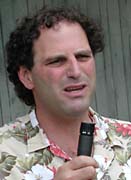 Darin
Price, McKinleyville. HSU chemistry
instructor. [photo at
left] Darin
Price, McKinleyville. HSU chemistry
instructor. [photo at
left]
We must take a new approach
and realize we do not need new taxes to keep the programs we
want if we get every bit of value out of every dollar. I also
know the North Coast has largely been ignored by the rest of
the state. Our resources are taken and our fish and wildlife
suffer the consequences. We need to send a message to the rest
of the state that our North Coast issues do matter and we won't
be ignored.
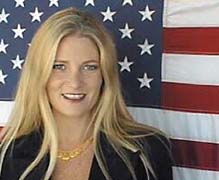 Reva
Renee Renz, Tustin. Small business
owner. [photo at right] Reva
Renee Renz, Tustin. Small business
owner. [photo at right]
I am a fiscal conservative and
a "thinking Republican." As a small-business owner
I want to ensure changes in the failing workers' compensation
system and see restraints taken off business. Returning this
state to a vibrant business environment is the first step towards
our recovery. As the owner of Deva's [a bar in Orange County],
I am against any increased taxes on alcohol and tobacco. As a
citizen, I want to protect our personal freedoms, which are slowly
eroding thanks to liberal Democrats. What happened to self-responsibility?
We need more programs that help people help themselves.
Ned Roscoe, Benicia. Cigarette retailer.
Our customers pay $1,000 more
in taxes than similar citizens. They're concerned about paying
their rent and their mortgages and having jobs. They want no
new taxes of any kind, no stupid new laws of any kind, someone
to get the work of government done and to make California competitive
with other states. I could do the work -- and someone needs to
do it.
Georgy Russell, Mountain View. Software engineer.
California has a plutocracy,
a government for the wealthy, and I want to put an end to that.
I want to see the Democratic Party take stands on tough issues,
and distinguish itself from moderate Republicans. My platform
includes clean energy, clean elections, abolition of three strikes
and the death penalty, passage of a gay marriage initiative,
legalization of marijuana and fiscal discipline in California.
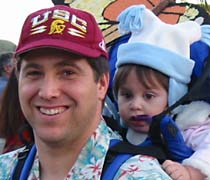 Lawrence Strauss,
Studio City. Lawyer, businessperson,
student. [photo at left] Lawrence Strauss,
Studio City. Lawyer, businessperson,
student. [photo at left]
I am fiscally responsible and
socially aware. My life experience has given me the ability to
solve problems and bring people together. Every individual has
to spend within his budget. Government needs to be fiscally responsible
and not spend money when it does not have it.
Humboldt Residents on
how they plan to vote -- and why.
SUSAN MASTEN, Yurok tribal chairperson
No / Bustamante
"[Arnold's] ads show that he knows nothing about Indian
Country."
CHRIS CRAWFORD, president of Justice Served
Yes / Schwarzenegger
"Davis panders shamelessly to special interests."
MARILYN BENEMANN, co-owner, Ferndale Books
No / Bustamante
"We need an experienced person."
JOAN RAINWATER-GISH, Senior Vice President,
Six Rivers Bank
No / Bustamante
"[The recall] starts the erosion of our democracy."
JOHN WOOLLEY, 3rd District Supervisor
No / Bustamante
"Recalls should be reserved for significant illegal activities
and/or mental impairment."
LARRY GOLDBERG, owner, NetHelp
No / Bustamante
"I'm sick over how the democratic process has been hijacked
by rich Republicans."
MIKE HARVEY, chairman, Humboldt County Republican
Party
Yes / Scharwzenegger
"What this recall is about is the lack of honesty in Sacramento."
BRIAN MAU, Humboldt County Democrats
No / Bustamante
"It's a circus of amateurs, and we're paying $65 million
to watch."
PETER LA VALLEE, mayor of Eureka
No / Bustamante
"Gov. Davis has done nothing to warrant a recall."
DAN HAUSER, Arcata city manager
No / Bustamante
"I do not like Gray Davis [but] the recall is not appropriate."
ROY HEIDER, former 2nd District Supervisor
Yes / McClintock
[McClintock] seems to be the only one who's answering the questions.
LIBBY MAYNARD, Ink People Center for the Arts
No / Bustamante
"Davis is not a criminal."
|
DEVIN THEOBALD, president of the HSU College Republicans
Yes / Schwarzenegger
"The only thing Republican about [Arnold] is the letter
`R' next to his name."
SELMA K. SONNTAG, chair of the Department of Government
and Politics, Humboldt State
No / Undecided
"[Voting for Camejo] would be making a statement."
LINDA DISIERE, real estate broker
Yes / Schwarzenegger
I would have voted for [Ueberroth]; he's a real businessperson.
RAY RAPHAEL, historian and author
No / Undecided
"It's bizarre and ironic that the guy who is talking sense
-- [Camejo] -- is marginalized."
DOUG THRON, 2002 Green Party candidate for Assembly
Yes / Camejo
"Gray Davis is the most crooked bastard who ever ran for
office."
DR. ANN LINDSAY, physician
No / Probably Bustamante
"[A recall would] grind the whole business of governing
to a halt."
JOHN FULLERTON, CPA
No / Schwarzenegger
"We should respect the election process and not recall somebody
because we disagree with their views."
DEAN HEYENGA, mayor of Trinidad
No / Undecided
"Anybody with a million dollars can get a [recall] on the
ballot."
DUANE FLATMO, artist
No / Undecided
"The Republicans are trying to overthrow an election."
DAVE MESERVE, Arcata city council member
No / Camejo
"The whole thing is inconsequential in the face of what's
going on nationally."
MEL BERTI, mayor of Fortuna
Yes / Schwarzenegger
"If we don't get rid of Davis, he'll break every city and
county in the next two years."
RICK GENTRY, owner, Bohemian Books
No / No one
"I think it's a mistake."
|
|
Suspect Proposition
Is Prop.
54 color blind, or just blind to racial discrimination?
by
EMILY GURNON
IN ADDITION TO THE GOVERNOR'S
RECALL , there's another controversial item on the Oct. 7 ballot
-- Proposition 54, which depending on who you talk to will either
promote racial unity or hinder efforts to create an equitable
society.
Dubbed the "racial privacy
initiative," Prop. 54 would ban the gathering and use of
racial data by state and local governments, with some exceptions.
Proponents say that California
must become a "color blind" to achieve racial harmony.
"At one time, it was important
to have a check-off box of what race you are, but it's time to
move on and to think of ourselves as Californians," said
John Fullerton, a certified public accountant in Eureka and a
former chair of the Republican Central Committee for Humboldt
County. Classifying people as black or white or Hispanic is "divisive,"
he said, "and in the long run, Prop. 54 will help in that
divisiveness."
Opponents of the measure argue
that the initiative will make it much more difficult for researchers
to gather the raw data that are needed to detect discrimination
in areas such as public health, law enforcement and minority
enrollment. Far from promoting unity, they say, the measure will
mask bias.
"We can't work on solutions
if we can't even get information to find out what the problem
is," said Christina Accomando, associate professor of English
at Humboldt State, who also teaches ethnic studies.
"The reality is that racial
disparities continue to exist in U.S. society. By banning information,
you don't end discrimination -- you merely blind us to the reality
of discrimination. Closing your eyes to something doesn't make
it go away."
Prop. 54's author is none other
than Ward Connerly, the African-American University of California
regent who made history by spearheading Proposition 209, the
controversial 1996 initiative that banned affirmative action
in public education, employment and contracting. In a recent
op-ed in the San Francisco Chronicle, he came out for
the racial privacy initiative, arguing in a "can't-we-all-get-along"
vein that income and class are more relevant to today's social
problems than race.
In the written argument included
in voters' guides, however, Connerly and other supporters get
more strident.
"Classification systems
were invented to keep certain groups `in their place' and to
deny them full rights," he writes, citing slavery and the
Nazi extermination of Jews as examples.
Besides, we Californians "resent"
being classified and are getting tired of government forms "with
row after row of these rigid and silly little `race' boxes,"
the argument states.
The fact that the measure is
described as one of "privacy" is intentionally misleading,
said Dr. Ann Lindsay, a physician and past president of the Humboldt-Del
Norte County Medical Society.
"I think that voters who
aren't careful will think it's a good idea," she said. "It's
a trick."
Lindsay said that while the
initiative includes an exemption for "medical data,"
it would apply only to doctors' records of their own patients
-- not to public health surveys and epidemiological studies that
help determine, for instance, whether certain diseases are more
prevalent among certain ethnic groups.
(The Legislative Analyst's written
analysis of the measure hedges on this point, saying that public
health surveys' use of race as a classification "might be
allowed to continue.")
Accomando agreed that privacy
was a red herring in the issue, since indicating one's race is
voluntary. "Anyone who wants to remain private about their
ethnicity can do so."
Also on the ballot Tuesday
is Proposition 53, which "dedicates
up to 3 percent of General Fund revenues annually" to state
and local infrastructure projects, such as highways, universities,
parks, wastewater treatment facilities and prisons. The projects
do not include those needed at schools and community colleges,
since funds are already earmarked for those uses.
Fullerton, the CPA, said he
supports the measure because governments tend to neglect infrastructure
needs in tight budget years.
Such an approach "will
come back and hurt us" in the future, he said.
"If you don't fix that
hole in the roof and you let it go, you end up having to replace
the roof instead of just a simple repair," he said.
But Ronnie Swartz, a social
work instructor at Humboldt State, said the measure is not as
straightforward and innocuous as it sounds.
When money is dedicated specifically
for one use, other programs will pay, he said.
"There will be even less
to spend for health care, for the child welfare system, for the
criminal justice system, for public safety," Swartz said.
"People think, `Yeah, we should force them to spend a lot
of money every year [on infrastructure].' Folks are not necessarily
thinking of the implications."
Little known by voters is the
fact that the measure was a critical dealmaker in the record-length
state budget negotiations of 2002; it convinced state Republicans
to sign on to the budget plan.
"We've been anxious to
get something like this done for quite a while," Bill Hauck,
director of the California Business Roundtable, an association
of corporate chiefs, told the Associated Press.
The measure is supported by
Jon Coupal, president of the Howard Jarvis Taxpayers Assocation,
and Allan Zaremberg, president of the California Chamber of Commerce.
ANALYSIS
Playing Hardball
The recall
isn't illegal. It's just mean.
by KEITH
EASTHOUSE
DEMOCRATS ALL THE WAY UP TO
SEN. DIANNE FEINSTEIN and former President Bill Clinton have
been repeating it for several weeks now: The recall of Gov. Gray
Davis is an attempt by Republicans to hijack the governor's office.
Is that true?
Yes and no, according to a local
historian and two Bay Area public policy experts.
John Ellwood, a professor at
the Goldman School of Public Policy at the University of California
at Berkeley, said that the popular perception that an elected
official can only be recalled if he or she is guilty of misconduct
in office
is simply false.
"Those who sign [a] recall
petition can offer any reason for ouster -- not just malfeasance
in office," Ellwood wrote in an op-ed that appeared in the
Washington Post in late July. "Voters can throw the
rascal out because they have changed their minds about his policies,
because of his private life, or simply because they no longer
like his looks."
In a telephone interview this
week, Ellwood affirmed that those seeking to unseat Davis are
playing by the rules. But he said that given the fact that Democrats
may retaliate by launching a recall bid of their own in the event
that Davis is kicked out, "I think it's a terrible way to
run the state government."
Ellwood said he disagreed with
the term hijacking because it implies some sort of long-planned,
clandestine effort. "This is not a story of a grand conspiracy
hatched in the basement of the White House," Ellwood said.
"It's a story of Republicans playing hardball and Democrats
playing softball."
How have the Democrats played
softball? Essentially by failing to unite.
One hardball response, Ellwood
said, would have been to find a stronger replacement candidate
than Bustamante. "He's sinking like a stone. There's a bias
against short, fat guys." People who heard last week's debate
on radio, Ellwood said, praised Bustamante's performance. But
not those who saw it on television. "He just doesn't look
good," Ellwood said.
Another hardball ploy would
have been to refuse to put up a replacement candidate and to
have united behind Davis. "They could have made it from
day one Davis versus Schwarzenegger," Ellwood said.
Henry Brady, a professor of
political science and public policy at Berkeley, said the timing
of the recall effort particularly troubled him.
"It started back in January"
-- the same month Davis was inaugurated for a second term --
"and you have to ask yourself if he was given any chance
to prove he could do better in his second term than in his first.
Is that how we want to run things?"
Local historian and author Ray
Raphael said the recall effort against Davis "does not fit
the mold for which the recall was intended, which was to curb
flagrant abuse.
"One political party that
could not muster 50 percent of the vote [in the last election]
is taking advantage of a valid but imperfect law in such a way
that they can gain control [of the governor's office] with, say,
30 percent of the vote."
Republicans, of course, argue
that Davis deserves to be recalled because he more than anyone
else is responsible for the financial mess the state is in.
The power of the electorate
to recall elected officials all the way up to the governor was
inserted into the state constitution in 1911, during the "progressive
era," a reform movement aimed in part at combating the powerful
influence of railroads.
"The major railroads were
able, by buying off the Legislature if necessary, to thwart attempts
to create policies that would provide greater rights and benefits
to workers and small-business owners," Ellwood wrote in
the Post. "Reformers felt that playing by the rules
was useless, [so led by then-Gov. Hiram Johnson they] enacted
a series of procedures that allowed citizens to go around the
existing decision-making process to make policy directly."
California came late to the
progressive era reforms, and like a lot of latecomers its reforms
were particularly radical. That explains why California has the
most lenient recall provision of any state -- the signature of
only 12 percent of those who voted in the most recent election
is all that's needed to trigger a recall.
Ellwood thinks that needs to
be raised, probably to 25 percent, the national average for states.
He also thinks the law needs to be amended so that in the event
a governor is recalled, the lieutenant governor would take over
-- either until the next regular election, or as soon as a separate
special election can take place.
Either way, that would go a
long way toward removing the partisan incentive that now exists,
where the party not occupying the governor's office may be tempted
to launch a recall any time the governor does something unpopular.
Camejo, at least, didn't ignore Humboldt
Green Party candidate says he's not a spoiler
by BOB
DORAN
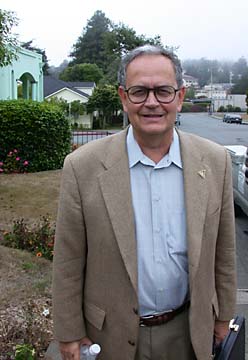 ASIDE FROM THE SOLE LOCAL CANDIDATE,
DARIN PRICE, HUMBOLDT COUNTY had little chance to meet the gubernatorial
candidates face to face. A notable exception was the Green Party's
Peter Camejo, who came through the area late last month. What
follows are excerpts from an interview that he granted to the
Journal between campaign stops. ASIDE FROM THE SOLE LOCAL CANDIDATE,
DARIN PRICE, HUMBOLDT COUNTY had little chance to meet the gubernatorial
candidates face to face. A notable exception was the Green Party's
Peter Camejo, who came through the area late last month. What
follows are excerpts from an interview that he granted to the
Journal between campaign stops.
Why are you running for governor?
There's a crisis in California around the budget. We had five
years with the greatest income ever in the state of California,
and instead of ending with a very sizable reserve surplus, we
ended up with a massive deficit, the worst deficit any state
has ever had. It shows utter incompetence and fiscal irresponsibility.
People are very disenchanted with Gray Davis, but not necessarily
happy with what the Republicans offer; after all, they've created
the biggest deficit the world has ever seen in the federal government
and the people of the United States will have to pay for that.
So what we're calling for is a fair tax. The wealthiest people
in California pay the lowest tax rate. The average person is
paying a 28 percent higher tax rate than the wealthy. I've made
this point: If you increase the wealthiest 5 percent to the same
tax rate as the average person, you'll have a surplus in the
budget. That's what we should do instead of cutting back education,
health care and all the social services -- just create a fair
tax. Corporations used to pay 9.6 percent of their profits in
taxes in California, now they're paying 5.3 percent; they almost
cut them in half. Taxes have been going down on the wealthy while
they go up on the poor.
Do you blame Gray Davis for this shift?
The fiscal irresponsibility is [Davis' fault]. He's the one who
was in charge.
Do you support the idea of recalling Davis?
Absolutely. I don't think he should be allowed to remain in office
one more day. The things he's done are beyond the pale. The man
is corrupt. He has violated the simplest care for the state.
He signed contracts with the energy companies giving away our
money, then tried to hide [that within those contracts was a
clause saying] that if they polluted, California would pay their
fines, which in effect gives the companies a free license to
pollute.
I think anyone who opposes [the recall] because the Republicans
happened to have initiated it has their logic backwards. Just
because you disagree with those who initiated it and think they
have ulterior motives, it doesn't make the [recall] invalid.
Gray Davis has opened the door for the Republicans to take the
governorship despite the fact that they're a minority in California.
My job is to close that door, [to stop] the Republicans from
coming in. But you don't do that by supporting Davis' incompetence.
You don't support a bad thing in order to stop another bad thing.
Two wrongs don't make a right.
Press reports hint that you would not be opposed to Bustamante
winning.
I've called on Gov. Davis to resign, because there's not a single
poll that shows him surviving the recall. Let Bustamante become
governor [now]; the recall then fails; the Republicans don't
win; and Davis is out of office. People say this means I'm for
Bustamante. I'm not. My platform is clear; I'm critical of the
Democrats. But given this situation, this crisis that we have,
I want to make it clear, if the Republicans should get in, it's
Gov. Davis' fault.
Certainly I see Bustamante as very different from Gray Davis
and very different from Arnold Schwarzenegger, who I see as a
very dangerous person. [Arnold] is hiding his platform and the
reason he hides it is because the people would be against it.
But we know what it really is. He might put on a good act, but
we know who his director is -- it's Pete Wilson. And we know
who the producer is -- it's George Bush. And we know what they
stand for, so we know what's going to happen. Pete Wilson robbed
our pension funds when he was governor; he fought to increase
the apartheid system against the immigrants, who are here forever
to stay, who are the lowest paid workers in California. He wanted
to throw their children out of school. This man is horrendous,
yet that is who Arnold Schwarzenegger turns to.
What I'm saying is, the Greens have the platform to solve this.
If we had [instant run-off] elections [in which voters rank candidates
in order of preference], the first choice would be Green, the
second choice could be Bustamante for those who want to stop
Arnold.
Some would argue that under our current two-party system the
Greens merely play the role of spoiler.
The problem with that argument is it's a total insult to the
voters. No one is forced to vote Green. People who ask such questions
are implying that the Greens should take it upon themselves not
to allow people to vote Green, that we shouldn't run. Every voter
knows what can happen [when they vote Green]. But some people
are so angry at the Democrats and the Republicans, so frustrated
with democracy in America, that they don't care who gets elected.
They are going to send a message to the existing system.
It's like the Nader vote. Every person who voted for Nader in
Florida knew it meant it could [help] Bush. So people should
be angry at those voters, not at Nader. All Nader did was say,
"This is what America needs," and presented a platform.
What we have to do is change the election laws [and] establish
instant run-off voting to end spoilership. [Because instant run-off
voting allows voters to rank candidates in order of preference,
when there is no initial majority winner, a runoff recount can
be conducted without a new election to determine which candidate
is actually preferred by a majority of voters.] If we establish
that, the Green vote will explode and the Green Party will rise
very rapidly. Why [should we have] a system where the voter has
to chose between voting for a third party and having a result
that is the opposite of their intent? The fact that the electoral
system is set up to work against third parties is more reason
for us to run, and to present our alternative, especially to
the Democratic Party, because that's who's being hurt by the
Greens. We say, "Change your ways, allow democracy, or you
will pay a penalty."
IN
THE NEWS | GARDEN | PUBLISHER | ART BEAT | GOOD NEWS | CALENDAR
Comments?

© Copyright 2003, North Coast Journal,
Inc.
|

![Yes or no and who? California's recall frenzy [photos of Gray Davis, and governor candidates]](cover1002-photohed.jpg)
 Badi
Badiozamani, San Diego. Entrepreneur,
author, executive. [photo
at left]
Badi
Badiozamani, San Diego. Entrepreneur,
author, executive. [photo
at left]
 Lorraine
(Abner Zurd) Fontanes, Los Angeles.
Filmmaker. [photo at left]
Lorraine
(Abner Zurd) Fontanes, Los Angeles.
Filmmaker. [photo at left] Diana
Foss, San Jose. Mother. [photo at right]
Diana
Foss, San Jose. Mother. [photo at right] Rich
Gosse, San Rafael. Educator.
[photo at left]
Rich
Gosse, San Rafael. Educator.
[photo at left] Eric
Korevaar, La Jolla. Scientist/businessman.
[photo at right]
Eric
Korevaar, La Jolla. Scientist/businessman.
[photo at right] Dick
Lane, Sunnyvale. Educator. [photo at left]
Dick
Lane, Sunnyvale. Educator. [photo at left] Gary
Leonard, Los Angeles. Photojournalist/author.
[photo at right]
Gary
Leonard, Los Angeles. Photojournalist/author.
[photo at right] Paul
Mariano, Martinez. Attorney.
Paul
Mariano, Martinez. Attorney. Charles
"Chuck" Pineda, Jr.,
Sacramento. State hearing officer. [photo at right]
Charles
"Chuck" Pineda, Jr.,
Sacramento. State hearing officer. [photo at right] Darin
Price, McKinleyville. HSU chemistry
instructor. [photo at
left]
Darin
Price, McKinleyville. HSU chemistry
instructor. [photo at
left] Reva
Renee Renz, Tustin. Small business
owner. [photo at right]
Reva
Renee Renz, Tustin. Small business
owner. [photo at right] Lawrence Strauss,
Studio City. Lawyer, businessperson,
student. [photo at left]
Lawrence Strauss,
Studio City. Lawyer, businessperson,
student. [photo at left] ASIDE FROM THE SOLE LOCAL CANDIDATE,
DARIN PRICE, HUMBOLDT COUNTY had little chance to meet the gubernatorial
candidates face to face. A notable exception was the Green Party's
Peter Camejo, who came through the area late last month. What
follows are excerpts from an interview that he granted to the
Journal between campaign stops.
ASIDE FROM THE SOLE LOCAL CANDIDATE,
DARIN PRICE, HUMBOLDT COUNTY had little chance to meet the gubernatorial
candidates face to face. A notable exception was the Green Party's
Peter Camejo, who came through the area late last month. What
follows are excerpts from an interview that he granted to the
Journal between campaign stops.